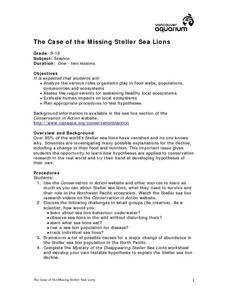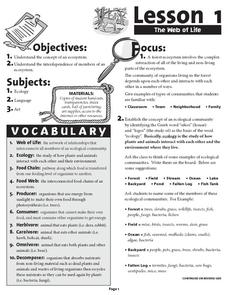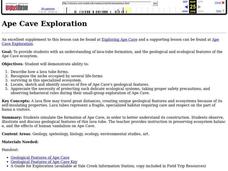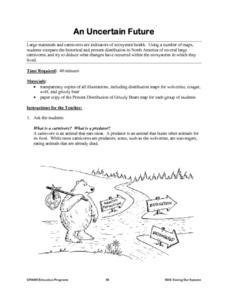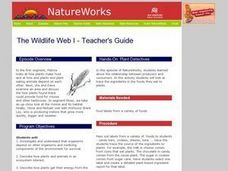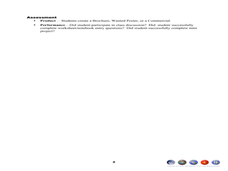Curated OER
It's all Interconnected
Learners participate in a number of activities to investigate the food web, species extinction, predators and prey, and biological diversity.
Curated OER
The Case of the Missing Steller Sea Lions
Students identify and analyze the various roles organisms play in food webs, populations, communities and ecosystems. Students assess the requirements for sustaining healthy local ecosystems. STudents evaluate human impacts on local...
Curated OER
Backyard Wildlife Conservation
Students survey local wildlife. They distinguish between permanent and migrating or seasonal species. Students identify species and describe the ecological niche. Students research the food chain and food web for the backyard...
Curated OER
The Great Kapok Tree: A Social Studies Lesson
Students examine how plants, animals and people need each other in order to survive. They simulate an ecosystem in a food web and role play certain animals or plants. They answer questions about their simulation to finish the activity.
Wild BC
Is Climate Change Good for Us?
Is it really that big of a deal if the global climate undergoes a little change? Young environmentalists consider this very question as they discuss in small groups the impact of different climate change scenarios on their lives,...
Curated OER
Estuaries, Estuarine Habitats, and Adaptations
Students conduct research on estuaries. They design and construct an estuary, describe the physical characteristics of an estuary, and create a diagram illustrating an estuarine food web.
Polar Trec
Plankton Parents
Plankton are so abundant in the ocean they outweigh all of the animals in the sea. In this three day activity, groups discuss and become familiar with plankton, capture females, and look for egg production on day three.
Curated OER
The Macaroni Lab
Young scholars are given an introduction to the "ecosystem", what factors make up an ecosystem (biotic factors, abiotic factors, food chain, producers, consumers and decomposers) and how those factors interact.
NASA
Decomposers Get Energy From Dead Things
When life gives you mold, make penicillin. Scholars design an inquiry experiment to determine what causes rotting and mold growth. It also covers decomposers and the important role they play for other living things.
Curated OER
Recyclers to the Rescue
Producers, consumers, food chains, and plants are the stars of this science lesson. Learners take part in an inquiry which helps them to discover the most effective and efficient way to grow a producer. They have a variety of containers...
EngageNY
Close Reading and Gathering Evidence from Frightful’s Mountain and “Welcome Back”
Where did the falcons go? Scholars read the article Welcome Back which describes the disappearance of falcons due to the use of pesticides. During a second read, learners annotate the text by marking unfamiliar words and facts about...
Curated OER
The Web of Life
Students participate in a game in which they discover the balance of life in the ocean. They identify different organisms that rely on different types of food. They answer questions to complete the instructional activity.
Curated OER
Classroom Composting
Pupils observe and describe the cyclic nature of life. They identify and appreciate the importance of a balanced ecosystem. Finally, students compare and contrast biodegradable and non-biodegradable resources in nature and describe the...
Curated OER
Identifying trophic levels and the skeletal system through Owl Pellets
Students identify a food chain sequence. They compare, identify, and record the rodent skeletal parts to a rodent skeletal diagram. Students construct a rodent skeleton from the skeletal parts found in the pellet. They are given the...
Curated OER
Ape Cave Exploration
Students simulate online the formation of Ape Cave, in order to better explain its construction. They observe, illustrate and discuss geological features of this lava tube.
Curated OER
Introducing Biodiversity
Young scholars investigate biodiversity by creating reports with their classmates. In this ecosystem lesson, students utilize the Internet to research the different types of life in our environment and different locations around...
Curated OER
An Uncertain Future
High schoolers study the distribution of large mammals and carnivores in an ecosystem. Using maps and historical data, they examine areas for these animals such as refuges, untouched forests, prairies and grasslands. Students determine...
Curated OER
The Wildlife Web I
Students explore the relationship between producers and consumers. In this activity, they trace the ingredients in the foods they eat to plants. Supplement to Natureworks episode from New Hampshire Public Television, but activities may...
Curated OER
Blue Mud Shrimp Mystery
Students explore invasive species on an environment. In this exploratory instructional activity students hypothesize why shrimp are on the decline and make a brochure or poster showing their results.
Curated OER
Species Interactions
Students research desert species to find where it lives, what it eats, and what species it interacts with directly. Upon completion of research, students construct a web of all the species as a class. This emphasizes the role each...
Curated OER
Bye-Bye Bison
Fourth graders investigate the bison's struggle for survival. They discuss the importance of bison while participating in an role playing activity showing how important the food supply and surroundings are to their survival.
National Geographic
Eat an Alien Invader
If you are looking for a lesson about invasive species to ocean habitats, you have arrived! Introduce the concept to learners and have them read an article about marine invasive species. Vocabulary, relevant web links, and a cute...
Curated OER
Look Up - Birds
Students investigate the concept of birds. They identify five different types of birds and name the characteristics that make them different than other living things. Students also name the different parts of the bird and how they are...
Curated OER
Ecological Citizen
Students examine the interconnectedness of living and non-living things that constitute an ecosystem. They examine fallen trees,insects, living trees, leaves, food webs, and forests. They conduct various activities and write poems about...

